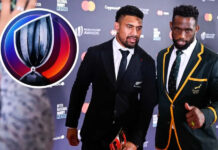With five days to go before Rugby Sevens gets underway in Glasgow, we take a look back on previous Commonwealth Games tournaments
Jonah Lomu was, of course, a Rugby mega-star by the time he competed in the first-ever Commonwealth Games in 1998, having previously announced his arrival to the world in Sevens at Hong Kong and then in Fifteens at the Rugby World Cup in 1995. However, the ‘Friendly Games’ have served as the launch pad for many players to go on and enjoy stellar careers in both formats of the Game, turning relative unknowns into household names almost overnight.
With its capacity to produce sublime moments of skill and athleticism as well as regularly attracting sell-out crowds, Rugby Sevens has brought much to the party since its introduction to the Commonwealth Games in Kuala Lumpar 16 years ago.
Here, we take a brief look back on past tournaments.
1998 – Kuala Lumpur, Malaysia
Brought into the fold a year before the IRB Sevens Word Series was launched, the inaugural Commonwealth Games featured two of the finest Sevens teams ever seen in the form of reigning Sevens World Cup champions Fiji and New Zealand. With Jonah Lomu and Christian Cullen in the same team New Zealand threatened to be unstoppable and so it proved, the Kiwis beating a Waisale Serevi-led Fiji 21-12 in a memorable final watched by a 17,000 capacity crowd. While the 1998 Commonwealth Games marked the start of New Zealand’s era of dominance under coach Gordon Tietjens, it also saw the book closed on the career of another great of the Game – Australia’s David Campese. ‘Campo’ bowed out on a high in international rugby by inspiring Australia to the bronze medal in the third/fourth place play-off match against Samoa.
Stars in their eyes: Jonah Lomu, Brian Lima, Joeli Vidiri, Waisale Serevi
2002 – Manchester, UK
Four years on from the heat and humidity of Malaysia the Commonwealth Games moved to Manchester in the north of England, an area not known for its sunny disposition. Sevens, though, remained the hottest ticket in town with New Zealand top of the billing in terms of box-office appeal on the back of three consecutive Series titles and a squad roster that now included the likes of future All Blacks Mils Muliaina and Rodney So’oialo in addition to established figures such as long-time Sevens captain Eric Rush. Having cruised through the pool stages New Zealand found themselves up against familiar foes in Fiji in the final at the newly built City of Manchester Stadium. Playing without the influential Rush, who was nursing bruised ribs from the semi-final win over Samoa, New Zealand laboured for long spells and were in danger of losing their crown as they trailed Fiji by a point with less than a minute on the clock. However the loss of Saisi Fuli to a red card eventually told as New Zealand ran in three late tries against their six-man opponents. South Africa won the bronze medal play-off match against Samoa 19-12. For hosts England it was a case of so near, yet so far, with a narrow defeat to Fiji ending their interest at the quarter-final stage.
Stars in their eyes: Bruce Reihana, Jean de Villiers, Rupeni Caucaunibuca, Josh Lewsey
2006 – Melbourne, Australia
New Zealand maintained their hold on the gold medal but it was England, not Fiji, who they beat in the 2006 final. An enthralling contest was watched by a 55,000-strong crowd at the Telstra Dome, a world record at the time for Sevens. England’s Mathew Tait returned to the international stage, after his chastening experience at the hands of Gavin Henson in Fifteens a year earlier, to light up the tournament with hat-tricks against Sri Lanka and Samoa and a wonderful double in the semi-final win over Fiji. He then made it nine tries for the tournament with another in the final itself. However two tries either side of half-time ensured New Zealand preserved their 100% record at the Games. Australia had brought in the likes of Chris Latham and Mat Giteau to boost their chances of home success but they failed to make the podium after being beaten 24-17 by Fiji in the third place play-off.
Stars in their eyes: Liam Messam, Cory Jane, Mathew Tait, Chris Latham
2010 – Delhi, India
The first Commonwealth Games to be held after Rugby Sevens’ inclusion in the Olympics had been confirmed was won by New Zealand, who claimed their fourth straight title with victory over Australia in the final. Liam Messam and D J Forbes ran the show but it was current All Blacks ace Ben Smith who caught the eye for Tietjens’ outfit. Fellow teenager Liam Gill went well for silver medal winners Australia, who pushed the New Zealanders hard before going down 24-17. Reigning IRB Sevens Series champions Samoa bowed out at the quarter-final stage after a narrow defeat to England.
Stars in their eyes: Ben Smith, Liam Gill, Ben Gollings













